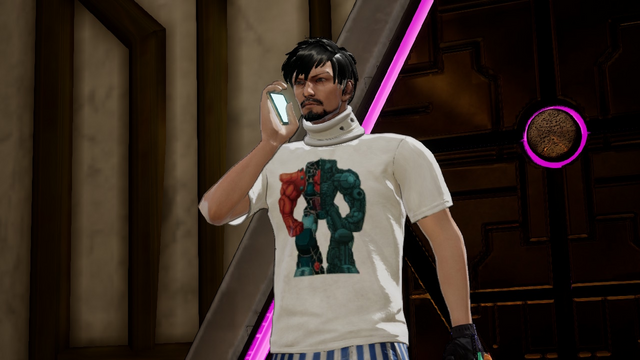I remember it like it was yesterday. I’m sitting on the floor of my friend’s darkened bedroom, lit only by the glow of his TV. I continued to manipulate the game’s protagonist, unaware of how tightly I was gripping the PlayStation controller with my sweaty palms.
With my resolve weakened by prior bloodshed concerning a former colleague, I walked through a door at the opposite end of a large dining room. Upon entering the hallway, I paused to practice aiming my pistol and confirmed the controls for running. Needless to say, I was on edge. The stiff movements and a static camera kept me there. This anxiety-filled state would soon be amplified by the sight of a zombie in the midst of removing a person’s head.
This event marked one of the few times a game has ever frightened me enough to want to stop playing. I promptly relinquished the controller after an undead dog leapt through a window, resulting in a panicked barrage of bullets and the obligatory “you’re dead” screen. It was a comical sight. Despite my fears and my friend’s laughter (he had already completed this section on a previous playthrough), I eventually bested Resident Evil.
This trial by fire produced a love for the budding survival horror genre. After leaving Raccoon City, I sought out silent hills and haunted clock towers. This led to misguided jaunts to Derceto Manor, Brennenburg Castle and Mount Massive Asylum. My journey through the world of survival horror would occasionally produce a thrilling encounter; a jump scare that actually succeeded in raising my heart rate. But none of them evoked the same level of fear and anxiety as the first few moments of Resident Evil. At least, not until I visited a post-apocalyptic London via Ubisoft’s Zombi…

The Sum of Its Body Parts
I didn’t get to play ZombiU when it launched back in 2012. Reluctant to purchase the Wii U at the time, I waited till it was re-released as the appended Zombi on current consoles. It came complete with frame rate issues and glitches. Both of which were overshadowed by excessive backtracking and a problematic use of light (the muddy visuals didn’t help). Toss in some glaring omissions from the Wii U version and you’ve got the recipe for a lackluster game. That being said, ZombiU/Zombi still offers the best survival horror experience I’ve ever played. The Resident Evils, the Outlasts, the awesome marketing “tool” known as P.T.—they all pale in comparison to Ubisoft’s mediocre title!
Hear me out. I’m in no way saying Zombi is better than every other game in its genre. I’m arguing that, under the right circumstances, Zombi is able to evoke high levels of fear and anxiety in a way that I haven’t seen since its release. To understand how, I’ll need to take a step back and explain Zombi’s take on the idea of player death.
Zombi presented a familiar premise. Someone is trapped in a city (in this case, London) amid a zombie outbreak. Stuff happens… There’s a prophecy… Something else happens… There are scientists and a secret society… Beyond old narrative trappings were key features that helped differentiate this title from what came before: claustrophobic first-person perspective focused on melee combat, the unique inventory system, some interesting puzzle design, and so on.
The most intriguing element, however, was permadeath. When the initial protagonist died, the player wasn’t presented with a game over screen. Instead, that particular character would become a zombie. The player would gain control of a brand-new survivor. From there they’d need to retrace their steps in order to confront their former selves and reclaim lost items.
Player death, and the loss of time and effort invested up to that point, is part of what makes these games so scary. Even though we know what’s happening isn’t real, we are still uneasy about dying. I’m not talking about the heightened tension that comes from not wanting to replay large portions of a game. Surely, not having to reload a past save file is enough motivation to keep your avatar alive. No, I’m talking about the real fear. The anxiety that makes you check your remaining ammo before traveling down a dark hallway or hesitate to open a recently unlocked door; it is the idea that “you” might die.

My One and Only
Jill Valentine succumbing to her four-legged attackers back in ’96 wasn’t the reason I stopped playing Resident Evil. I stopped playing because I didn’t enjoy feeling like I was getting chewed to bits. What helped me pick the controller back up, and ultimately start to enjoy these games, was the realization that I wasn’t Jill, Edward Carnby, or Alexandra Roivas. I was pretending to be them whenever I entered a derelict mansion or haunted estate. Zombi didn’t give me that luxury.
The random nature of each survivor (their names, background, and placement within Zombi’s plot are all arbitrary) helps strengthen the connection between them and the player. It’s easier to step into a protagonist’s shoes if they aren’t given a strong personality or some notable factor. This is one reason first-person horror games work so well. The limited view keeps the player focused on what’s happening around them and not the character themself. Zombi excels at this.
Knowing that once this person dies they’re gone for good is worrying. Worse still is having to kill a character after spending time as them.
Those two elements are enough to provide a tense gaming session. But Zombi is capable of much more—albeit haphazardly. Remember I said that it could evoke high levels of fear under the right circumstances? Well, those circumstances include not dying. I played through the majority of the game using the character I started with. As time wore on while I wore their nondescript skin, I struggled to separate myself from that particular survivor’s plight.
It didn’t start that way. Early on, I went about dispatching zombies just like in any other game. I was cautious to follow the Zombi’s rules about being silent and reserving ammo because I wanted to finish it. Being forced to replay parts of it or hunt down a zombie for my missing items just seemed like a hassle.
I also thought it would be a cool challenge to complete the game with the starter character. Maybe I could unlock a rare achievement (which I later found out didn’t exist). All of that changed as I got closer to the end.

A Shift in Perception
I’m not exactly sure when it happened. I just remember coming close to death. A bomb-toting zombie exploded in my face and forced me to flee. After healing, just as I had done after a thousand such encounters, I suddenly couldn’t continue. My anxiety spiked. I became overly cautious.
I followed each zombie kill with a long pause. Each whack of my baseball bat felt heavier. I wasn’t losing my breath like my onscreen counterpart, but I did physically respond to his fatigue. At some point my brain decided I was this random survivor.
Zombi’s two key pillars of tension interacted flawlessly, overshadowing the game’s many technical problems. The nondescript character left nothing between me and the dangerous digital world. Permadeath multiplied my investment and thus the stakes of each encounter. This tension continued to rise with the possibility of my survival; the closer I made it to the end of the game, the more I feared losing my character.
It was me (not the survivor) who had made it this far. And if I was careful, I could make it out of London alive. Essentially, Zombi subtly changed from a somewhat entertaining romp through a zombie-filled city to an anxiety-laden march toward what felt like an inevitable end. Ironically, that ending never came. The fear of losing my character—myself—actually became too much. I never completed the game.
Zombi successfully forced me away from itself, just like Resident Evil did in 1996. Only it wasn’t a jump scare or scripted atmosphere that did it this time. My own blurring sense of reality did me in.
I still load my old save from time to time and inch towards the credits. It only takes an hour or so before I need to stop and take another breather. At which point I’d play something less dreadful. Like Outlast 2…


